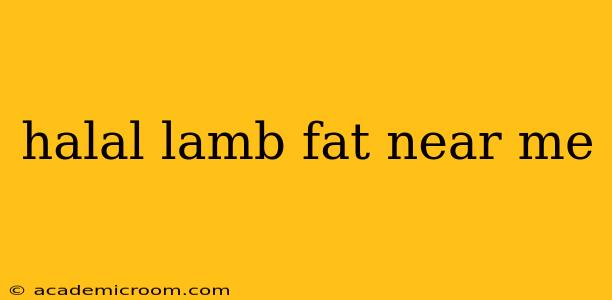Finding high-quality halal lamb fat can be tricky, especially if you're looking for it locally. This guide will help you navigate the search, providing tips and insights to ensure you source the best halal lamb fat near you. We'll address common questions and concerns, making your search easier and more informed.
Where Can I Find Halal Lamb Fat Near Me?
This is the most common question, and the answer depends heavily on your location and the availability of halal butchers and specialty stores in your area. Your best bet is to start with a multi-pronged approach:
-
Local Halal Butchers: These are often your best resource. Call ahead to check if they stock lamb fat or can order it for you. Many butchers are happy to accommodate specific requests, especially if you're a regular customer. Explain clearly what you need—the quantity and how you plan to use it (for cooking, rendering, etc.).
-
Muslim-Owned Grocery Stores: These stores often carry a wider range of halal products, including specialty items like lamb fat that may not be found in mainstream supermarkets.
-
Online Marketplaces: Websites and apps specializing in halal food delivery or local produce can be a great option, especially if local butchers or stores don't have what you need. However, always double-check the vendor's halal certification and reviews before ordering.
-
Ethnic Grocery Stores: Depending on your area, larger ethnic grocery stores that cater to Middle Eastern or South Asian communities may stock halal lamb fat.
What Should I Look For When Buying Halal Lamb Fat?
When selecting halal lamb fat, several factors should be considered:
-
Halal Certification: Ensure the product displays a reputable halal certification mark from a recognized organization. This guarantees the animal was slaughtered according to Islamic guidelines.
-
Freshness: Opt for lamb fat that is fresh and free from any off-putting odors. The color should be a natural creamy white or pale yellow. Avoid any signs of discoloration or rancidity.
-
Source: If possible, inquire about the source of the lamb fat. Knowing where it comes from helps you understand its quality and origin.
-
Quantity: Buy only the amount you need, especially if you don't plan on using it immediately, as it can become rancid over time.
How Can I Store Halal Lamb Fat Properly?
Proper storage is crucial for preserving the freshness and quality of halal lamb fat.
-
Refrigeration: Store it in an airtight container in the refrigerator. This will help to prevent it from absorbing odors from other foods and will extend its shelf life.
-
Freezing: For longer-term storage, freezing is recommended. Wrap it tightly in freezer-safe plastic wrap or aluminum foil before placing it in a freezer bag. This will prevent freezer burn and maintain its quality.
Is it the Same as Suet?
While both lamb fat and suet are rendered animal fats, they are not the same. Suet typically refers to the hard fat found around the kidneys and loins of beef cattle, whereas lamb fat comes from a lamb. They have slightly different flavor profiles and melting points.
How Long Does Halal Lamb Fat Last?
The shelf life of halal lamb fat depends on storage methods. In the refrigerator, it can last for several weeks, whereas in the freezer, it can last for several months. Always check for any signs of rancidity before using frozen lamb fat.
What are the Benefits of Using Halal Lamb Fat in Cooking?
Halal lamb fat adds richness and flavor to many dishes. It's particularly well-suited for roasting, frying, and making pastries. Many cooks appreciate its distinct flavor compared to other fats.
By following these tips and asking the right questions, you can easily locate high-quality halal lamb fat near you and enjoy its unique culinary benefits. Remember to prioritize freshness, halal certification, and proper storage to ensure the best possible experience.
